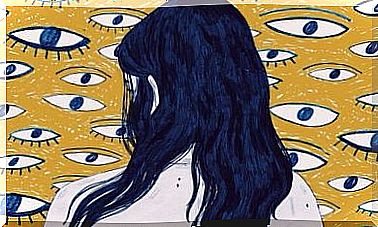Misophonia: Hatred Towards Certain Sounds

What really is misophonia?
As we have mentioned, misophonia consists of a decrease in tolerance to certain sounds. Those who suffer from it cannot tolerate hearing some specific sounds. What are background sounds for most people are deeply unpleasant sounds for others.
Noises such as chewing, the clinking of cutlery or the drumming of the fingers are unbearable for people suffering from misophonia. Some of the sounds that cause this discomfort are relatively low in intensity, on the order of 40 to 50 decibels.
This animosity towards sounds is amplified if the people who produce them have sentimental ties to those who produce them. For example, if they belong to the same family or are close friends. A Baltimore elementary school teacher, Meredith Rosol, diagnosed with misophonia, claims that she no longer eats with her parents. You only eat with them if you put a plug in your ears.
One of the problems that we face with this disorder is its difficult diagnosis. Therefore, it is also difficult to find an effective treatment: until recently it had not been classified as a disease.
Is misophonia a psychological disorder?
Some argue that misophonia is not a psychological disorder, it is not a phobia. It would then be a neurological condition. This neurological disorder is probably localized in certain structures of the central nervous system.
Where exactly this “so visceral” reaction comes from remains unknown. It could have something to do with damage to the medial prefrontal cortex, similar to what occurs in another medical condition called tinnnitus. Tinnitus is a phantom ringing or other noise in the ear. It is a perception commonly caused by damaged hair cells in the cochlea.

Symptoms of misophonia
People who suffer from this disorder or disease feel discomfort, anger, anger, panic, fear … They may even imagine attacking the person who produces these sounds. The sounds can be as normal as those produced by eating, drinking, sipping, breathing, coughing, etc.
These people may also feel discomfort by other types of repetitive sounds, such as chewing gum, blowing bubbles with it, the crunching of bones, etc. These people manifest anxiety and avoidance behaviors towards the people who produce them. In some very serious cases, the person can become so intolerant that violent behavior towards objects, people or animals involved can occur.
People with misophonia can develop a true obsession with these noises. Then the hypersensitivity spreads and there is an intolerance towards those people and / or situations where these sounds are produced.
Psychological problems arising from misophonia
People who suffer from misophonia can develop serious psychological problems. They may be aggressive or make the decision to avoid situations that precede or cause their discomfort. Thus, they can become isolated and feel a deep loneliness.
Because there are few resources to treat his ailment, his social integration is not favored. They only have the possibility of using earplugs or headphones to play music. That is, they are intended not to hear the sounds that cause discomfort, but not to solve the root problem.
How common is misophonia?
We do not know the prevalence of misophonia. Sufferers suggest that it is more common than is recognized. In patients with tinnitus, a prevalence of up to 60 percent is reported.
And is that hearing problems are more common than we think. Many times there is an adequate treatment, but other times it is more difficult to establish an effective treatment, especially when the problem is hypersensitivity to certain sounds. This is because physical and psychological factors interact in these types of problems.

How is misophonia treated?
To this day there is no known cure for misophonia. Cognitive behavioral therapy and tinnitus retraining therapy have been helpful for some patients. In others, these interventions have not been as effective. Many doctors are unaware of the existence of this disorder because it has only recently been recognized. This implies that in many cases it is not yet diagnosed.
There are certain psychological and hypnotic treatments that have also been effective in some patients, but in general it cannot be said that there is a cure for this condition. Pending more appropriate treatment, affected people remain condemned to live in a state of anxiety or isolation if they choose to avoid the sounds they cannot bear.
Bibliographic references:









To learn about misophonia and what it means, let’s read this story : “I’ve been like this all my life, it’s horrible. Going by any means of transport makes me completely unhinged. If I don’t wear earplugs or music with headphones, I get very nervous and irascible. Listen to the computer keyboard, eat gum, bite the fork when eating, slurp the soup … endless. I only dream of one day being able to be calm and not have to be alone or with my helmets, not to imitate or look bad at the people who do it… I cannot have a stable partner, it is normal to end up hating a person like me ”.
What you have just read is a true story of a person suffering from misophonia. But then what is misophonia? Basically, misophonia is defined as a great sensitivity (hypersensitivity) to a certain type of sounds.
It is one of the conditions that involve low tolerance to sound, in conjunction with hyperacusis and phonophobia. In people with misophonia, the body reacts in a certain way when it is exposed to certain sound stimuli.
The word “misophonia” was coined by doctors Pawel Jastreboff and Margaret Jastreboff in 2000. This term derives from the Greek “misos”, which means aversion and “phone”, which means sound. Thus, misophonia can also be defined as “selective sensitivity to sound”.